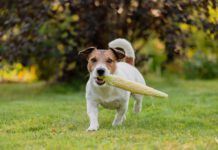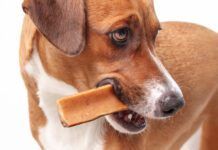Dog chews have real benefits. They can help with dental health, help alleviate anxiety, and provide mental stimulation. And, most dogs just love to chew.
“Chewing is your canine friend’s equivalent to scrolling through social media posts when you want to kill a few extra minutes,” according to American Animal Hospital Association (AAHA). “Bored dogs are often naughty—barking excessively, digging, and destroying your belongings—so encouraging appropriate chewing is important.”
Of course, as with any consumer product, navigating the wide array of options can be overwhelming. This article will help you make informed choices, ensuring your dog’s safety and well-being, including dental chews, anxiety-reducing chews, and allergy chews. (Also, check out Whole Dog Journal’s test of seven popular chews.)
Whole Dog Journal is reader-supported. If you purchase through links on our site we may earn a commission. Whole Dog Journal does not accept money for its food and product reviews.
Vet-Recommended Dog Dental Chews
Veterinary professionals and organizations like the American Veterinary Medical Association (AVMA) and the AAHA recommended products accepted by the Veterinary Oral Health Council (VOHC) when choosing a dog dental chew.
Dental disease is one of the most common health problems in dogs. It can lead to pain, infection, and even health issues affecting the heart, kidneys, and liver. While daily tooth brushing is most effective for at-home care, supplementary dental chews, which can help scrape away plaque and reduce tartar buildup are a valuable addition to your dog’s oral hygiene routine.
The VOHC seal is an independent indicator that a product has undergone scientific testing and is proven to reduce plaque and/or tartar. In short, a VOHC seal on a dental chew means a team of experts verified that the product is safe and effective.
Popular VOHC-accepted options include:
Greenies: Greenies have multiple products and sizes.
Earned the VOHC seal for helping to control both plaque and tartar.
WHIMZEES: This brand of vegetarian dental chew is well-known for their unique shapes.
Earned the VOHC seal for effectiveness in reducing plaque and tartar.
OraVet Dental Hygiene Chews: These chews are formulated to create a barrier to help prevent bacteria from attaching to a dog’s teeth.
Earned the VOHC seal for tartar control.
C.E.T. VeggieDent Chews: Virbac offers plant-based chews.
Earned the VOHC seal for helping to control plaque and tartar.
Purina DentaLife: A popular, consumer-friendly brand daily oral care treats.
Earned the VOHC seal for helping to control tartar.
Milk-Bone Brushing Chews: Known for ridged texture designed to scrub teeth as the dog.
Earned the VOHC seal for tartar control.
Pedigree Dentastix: This brand is widely available.
Earned the VOHC seal for helping to control tartar.
The VOHC’s official list is extensive and includes many product types, flavors, and sizes.
In addition to VOHC seal of acceptance look for ingredients like chlorophyll, enzymes, and zinc gluconate, which can further aid in oral health. While dental chews are beneficial, they are not a substitute for regular professional dental cleanings by your veterinarian.
For other types of chews, veterinarians recommend a nuanced approach to other chew types:
Dog Calming Chews: Easing Anxiety Naturally
If your dog suffers anxiety due to separation, thunderstorms, travel, or other triggers, calming chews can offer a solution. Many chews use natural ingredients like L-tryptophan, chamomile, passionflower, or hemp-derived compounds (such as CBD, where legal), even, according to some research reports, melatonin.
These ingredients work to promote relaxation. When selecting a calming chew, look for products with third-party testing to ensure purity and accurate dosing. Your vet can advise on the appropriate type and dosage for your dog’s specific anxiety level.
According to a Cornell DogWatch article, 83% of dogs given CBD chews prior to a stressful event showed a decrease in stress or anxiety-related behaviors. However, Cornell DogWatch warns that more research with different CBD products and dosages is needed. For that reason, it’s especially important to consult with your veterinarian about CBD chews.
No-Hide Chews: A Safer Alternative to Rawhide
Rawhide chews have been proven to bring significant risks, including choking, digestive upset, and intestinal blockages. “Rawhide is difficult to digest due to it being a byproduct of leather, making it difficult for a dog’s digestive system to break down. This creates a risk of obstruction in the esophagus or intestines if a dog swallows a large piece,” according to the Preventivevet.
A Cornell report concurs, adding that in addition to rawhide, “Chewing hard objects can result in either gradually wearing or fracturing of teeth. Use caution when offering your dog any hard objects including bones, antlers, hooves, and hard manufactured toys.” As a rule of thumb, if you can bend or flex the object, it is less likely to fracture a tooth. Additionally, if something is too hard for you to chew, then you should not allow your pet to chew it.
No-hide chews are a safer alternative and are typically made from digestible proteins like chicken, beef, or pork. They are designed to break down more easily in a dog’s digestive system, reducing the risk of obstruction.
Dog Allergy Chews: Soothing Itchy Skin and More
Symptoms of allergies in dogs include itchy skin, paw licking, ear infections, or digestive issues. Allergy chews often contain ingredients aimed at supporting skin health and immune function. Common ingredients include omega-3 fatty acids, quercetin (a natural antihistamine), spirulina, and probiotics. These ingredients work to reduce inflammation, strengthen the skin barrier, and regulate the immune response. If your dog is experiencing allergy symptoms, your first step is to contact your veterinarian to diagnose and treat specific allergens and develop a plan, which may include chews.
Vet-Recommended Options for Aggressive Chewers
Some dogs make short work out of chews that may be marketed as long-lasting. Aggressive chewers require durable, safe chews that can withstand their powerful jaws without splintering or posing a choking hazard. Also, long-lasting chews provide mental stimulation and keep energetic dogs occupied. For these dogs, vet-recommended options often include:
- Rubber toys: Brands like Kong offer durable rubber toys that can be stuffed with treats, providing a long-lasting challenge without the risk of splintering.
- Hard cheese chews: Made from yak and cow milk, these chews are hard and long-lasting, gradually softening as your dog chews them.
- Nylon or polymer chews: Tough, nontoxic synthetic chews are designed to withstand aggressive chewing and are specifically designed for this purpose.
Something to Chew On
Choosing the right chew for your dog involves careful consideration of your dog’s individual needs, chewing style, age, and any health concerns. One dog might take a long time to chew through the same chew that another dog gnaws slowly. Never leave your dog unattended when he’s chewing on anything; there is always a risk of choking.
Overall, by prioritizing general vet-recommended products, talking with your own veterinarian, and doing your research on the benefits and risks of different types of chews, you can provide your canine companion with safe, enjoyable, and beneficial chewing experiences.







I have tried one of the vohc dog recommended dental chews. My opinion is save your money and spend it by buying the vohc dog toothpaste
None of the links in the list of VOHC-accepted products work!